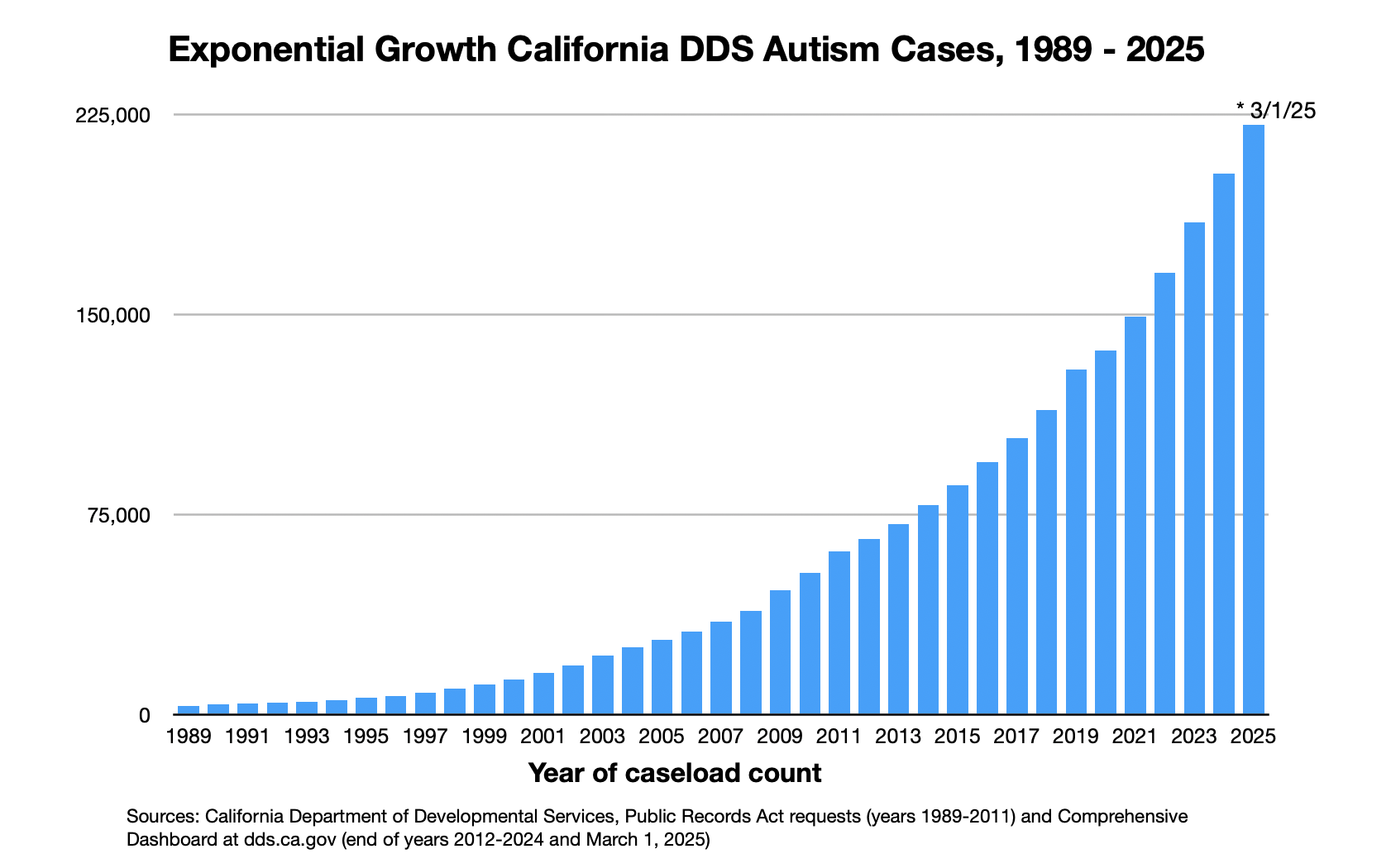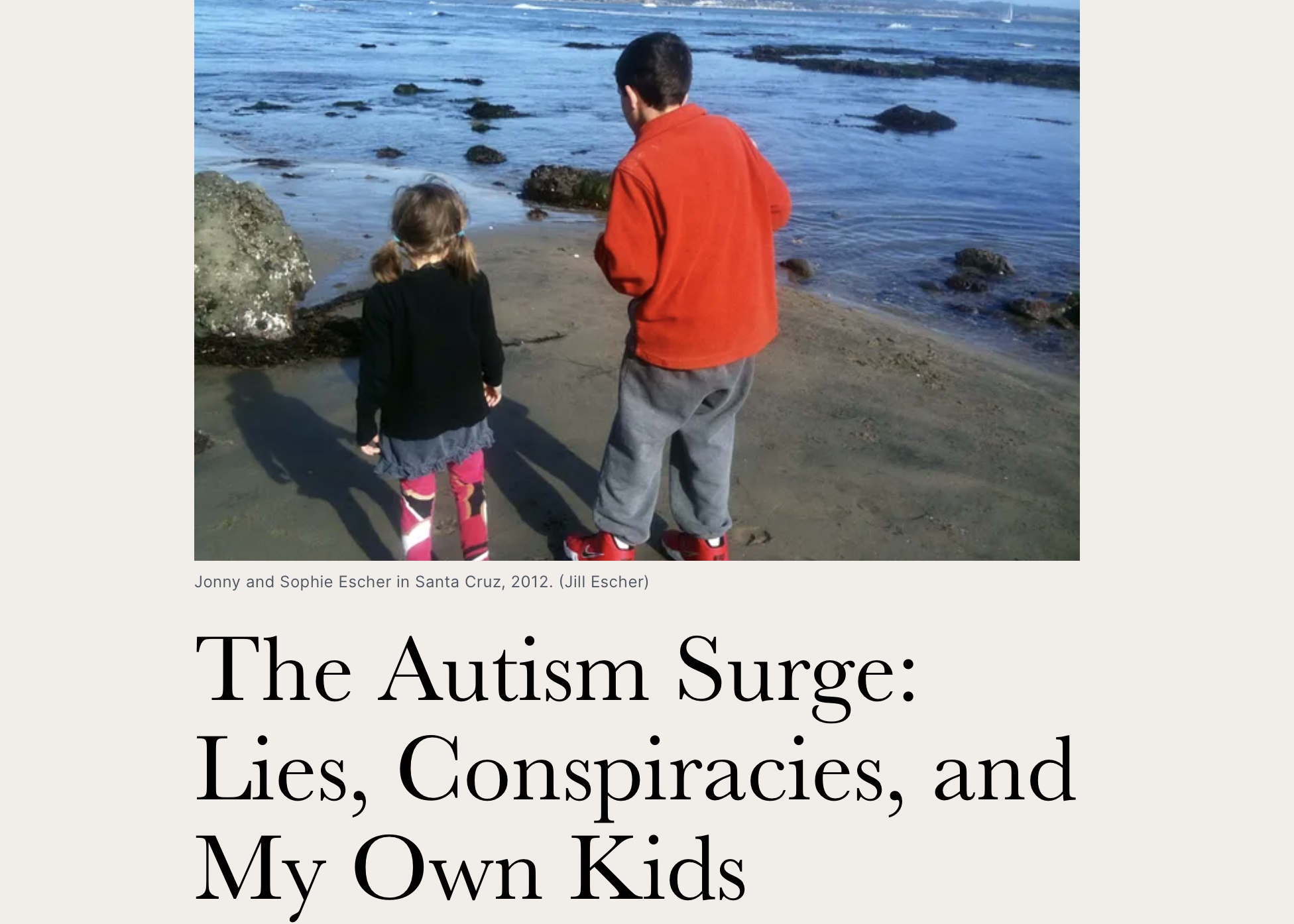Selected Writings and Presentations
What RFK Jr. Gets Right — and Wrong — About Autism. At Tablet Magazine (April 2025)
No, Autism Is Not "Genetic." It’s Mostly a Transcriptome-opathy. At Substack (March 2025)
Trump Wants Answers About Autism. Here’s How His MAHA Can Succeed. At Substack (March 2025)
Adults with Disabilities Deserve to Work, The Free Press (February 2025)
Profound Autism and the Move Toward Clarity @ Autism Society San Diego Conference (February 2025) Slides
Autism Parents Cannot Die! @ Autism Society San Diego Conference (February 2025) Slides
Trump, RFK and the Autism Dilemma, The Free Press (November 2024)
Getting Real About Autism’s Exponential Explosion, NCSA (October 2024)
Parental Exposures in the Missing Heritability of Autism Meeting, background section only (October 2024)
Essay: Discovering My Gender-Bendy Prenatal History, at Reality’s Last Stand (July 2024)
Autism’s Rising Rates: A Deep Dive into the Data, NCSA webinar (February 2024)
Profound Autism: An Imperative Diagnosis, Pediatric Clinics, co-author (January 2024)
Essay: The Autism Surge: Lies, Conspiracies, and My Own Kids, The Free Press (July 2023)
Presentation: The Question of Germ Cell Toxicant Exposures in the Etiology of Offspring Neurodevelopmental Pathology, UCLA Lundquist Institute (May 2023)
TEDx Monta Vista: 5 Things You Must Know About Autism — Reality Check Edition (April 2023)
Don't forget the gametes: When neurodevelopmental pathogenesis starts in the sperm and egg, Neuroepigenetics Symposium (2022)
Beyond Genes: Germline Disruption in the Etiology of Autism Spectrum Disorders, in Journal of Autism and Developmental Disorders (2021)
Exploring the role of non-genetic inheritance in the etiology of human disease, in Biology of Reproduction (2021)
How family histories can inform research about germ cell exposures: the example of autism, in Biology of Reproduction (2021)
How the Biden Administration Can Put Autism Policy on the Right Track in 2021, in Medium (2021)
“Heritable Impacts of General Anesthesia: An Urgent Question for Genetic Toxicology and Autism Research," at Environmental Mutagenesis and Genomics Society Conference (2020) PDF Video
General anesthesia, germ cells and the missing heritability of autism: an urgent need for research, in Environmental Epigenetics (2020)
California must face reality: Autism cases are increasing, at CalMatters (2020)
Heritable Impacts of Germ Cell Exposure to Toxicants: A Gap in Research and Regulation, at the National Institute for Environmental Health Sciences (2019)
The Torrential Surge in Autism Continues Unabated, in National Council for Severe Autism (2020)
Pregnancy Drugs, Fetal Germline Epigenome, and Risks for Next-Generation Pathology: A Call to Action. By Jill Escher and Suzanne Robotti, in Environmental and Molecular Mutagenesis (2019)
Bugs in the program: can pregnancy drugs and smoking disturb molecular reprogramming of the fetal germline, increasing heritable risk for autism and neurodevelopmental disorders? in Environmental Epigenetics (2018)
Review: Lost in a "Bermuda Triangle" of Profound Autism, review of Girl Storm (2023)
Review: God’s Plan, Our Circus (2023)
Review: Creating Quality of Life for Adults on the Autism Spectrum (2023)
Commentary: Steve Silberman’s Phony History of Autism Dealt Another Blow (2021)
Review: A Celebrated Brit's Memoir Flings the Doors Wide Open on Life with Severe Autism, at National Council for Severe Autism (2019)
Review: NeuroTribes, One Step Forward, Two Steps Back for Autism (2016)
See links to publications and presentations, 2013 to today, here.
I’m now on Substack! Check it out
Links
Jill Escher Substack
Escher Fund for Autism (including grant information)
Twitter/X
Germline Exposures website
National Council on Severe Autism website
Autism Society San Francisco Bay Area website
Beyond Genes conference site
In the Media
News Nation with Leland Vittert (September 2025)
The Tangle podcast (September 2025)
KGO TV (interview re September 22, 2025 White House autism briefing at timestamp 10.20)
Entanglements podcast (Undark magazine August 2025)
The New York Times, letter (July 2025)
Beyond Gender podcast (June 2025)
NPR 1A show and podcast (May 2025)
The New York Times (May 2025)
NPR All Things Considered (April 2025)
The Tangle podcast (January 2025)
Autism Spa podcast (December 2024)
BBC Radio 4 The World Tonight (November 2024)
The Bulletin podcast, Christianity Today (November 2024)
News Nation with Leland Vittert here (November 2024)
“What Is Autism? Peter Boghossian Podcast (July 2024)
ABCs of Disability Planning, Severe Autism, with Eric Jorgensen here (March 2024)
The Steven Spierer Show here (March 2024)
Autism Confidential, ongoing, here
The Hamilton Review podcast here (September 2023)
WABC Talk Radio with Frank Morano
July 2023 here August 2023 here
The Center for Public Integrity Million-dollar question: How to find safe homes for those with complex needs
Disability Scoop DSM Update Tweaks Criteria For Autism, Intellectual Disability
Disability Scoop Federal Panel’s Shift To ‘Neutral’ Autism Language Prompts Backlash
Conversations in Speech Pathology Podcast here (March 2022)
Mary Barbera Podcast here (December 2021)
SPARK for Autism Newsletter here (2021)
Autism Science Foundation Podcast here (2021)
Disorderly Blondes Podcast here (2021)
The John Rothmann Show, KGO AM San Francisco here (2021)
Dr Kevin Podcast here (2021)
NPR’s All Things Considered here (2020)
CalMatters here (2020)
Autism Science Foundation Podcast here (2020)
LOMAH Podcast here (2020)
Autastic Podcast, too many to list, here
NIEHS Environmental Factor here (2019)
Science Junkie Bets Big on Autism’s Environmental Origins, Spectrum News here (2016)
Mom on a Mission here (2013)
The Puzzle of Increasing Autism Prevalence
Research has failed to identify the causes behind the dramatic surge in autism, which began with births in the 1980s. Above is data from California’s Department of Developmental Services.
Autism is a label often given to individuals suffering from serious developmental brain dysfunction. The disorder is evident from the earliest years of life as faulty brain wiring results in a child failing to meet basic social, communication, behavioral and functional milestones, often later manifesting as intractable, lifelong disability. Autism rates have skyrocketed beginning with births in the 1980s.
No environmental factors investigated to date can explain the scorching increase, though some elements such as adverse perinatal events, fetal exposures to drugs such as anticonvulsants, and advanced paternal age contribute a small amount of risk.
Autism has been shown to be strongly heritable, but only weakly genetic. Only about 10-14% of cases can be explained by genetic roots, and those cases are usually de novo and typically what would be considered rare genetic syndromes and not autism per se. The abnormal brain wiring of autism is largely a question of unexplained inheritance.
So if it’s not genes and it’s not environment, what can possibly be causing this upsurge in novel, yet heritable developmental brain dysfunction?
Since January 2012 I have been advancing the novel hypothesis that certain toxicant exposures to germ cells (egg, sperm, precursors) can result in impaired gene function in genes related to early brain development. As offspring of the mis-programmed germ cells develop, their neurons receive faulty instructions and essentially fail to proliferate, migrate and wire up properly, manifesting after birth as sensory, processing, cognitive and behavioral impairments.
The primary exposure of concern at this time? A parent’s history exposure to surgery under modern agents of general anesthesia. This toxicant can affect the programming of the parent’s germ cells, and result in heritable neurodevelopmental pathology in the offspring.
Intriguingly this hypothesis could explain virtually all of the major mysteries of the autism phenomenon:
It is biologically plausible, eg, demonstrated in animal models + biological mechanism
It is consistent with prevalence increase starting with births in late 1980s / early 1990s, and the upward trajectory from that time
It would explain the strong heritability of autism, particularly the sharply increased sibling risk
It would explain the transcriptional dysregulation of fetal and early brain development (+ the disruption of GABAergic system)
It would explain the high male:female ratio, around 4:1 (this sex bias is seen in the animal models)
It would explain the heterogeneity of behavioral phenotypes, and related (eg, anxiety, ADHD, “BAP”)
It would explain the high regional variability, particularly higher rates in wealthier countries
However, based on common sense observation the absolute risk of an ASD outcome would have to be quite low; while the population risk could be rather high.
For more information please consult papers and presentations listed in the first column.
Bio
Jill Escher wears many hats in the autism world. As an autism research philanthropist though the Escher Fund for Autism she promotes and funds research on the genetic toxicology of autism and related neurodevelopmental pathologies. Her work has been lauded by the mutagenesis and epigenetics research communities, and she has served on the governing council of the venerable Environmental Mutagenesis and Genomics Society, where she co-chairs the Germ Cell and Heritable Effects special interest group.
As president of Autism Society San Francisco Bay Area from 2013-2019, she grew a nearly defunct affiliate of the Autism Society of America into a regional powerhouse. As president of National Council on Severe Autism since its inception she is promoting awareness and solutions for individuals and families affected by severe forms of autism. She is also a housing provider to adults with developmental disabilities in the Bay Area through her family business, Claradon Properties, LLC. Most importantly she is the mother of two children with nonverbal forms of autism, a young man of 25 and a teen girl of 18. Photos from some years ago:
Jill’s personal story has been published in the journal Environmental Epigenetics and on her research website GermlineExposures.org.
A former lawyer, she clerked for members of the federal district court judiciary after earning a JD from UC Berkeley Law School in 1996, with a concurrent Masters in City and Regional Planning. She also has a BA from Stanford University, 1987. She lives with her family in San Jose, California.
Contact: jill.escher@gmail.com
Jill and Sophie, 2024
Policy Advocacy
ECNs would be a new form of nonprofit entity serving the essential care needs of the rapidly growing population of indigent adults unable to care for themselves.
Apart from the genetic toxicology of autism, my other passion is finding ways to reform federal policy to unleash capacity in supports, services and housing for the burgeoning population of adults disabled by autism.
One idea is creation of a new form of federal nonprofit entity, the “Essential Care Nonprofit” or ECN.
ECNs would be a new form of nonprofit entity carved out for special federal tax (and other) treatment because they provide basic daily-care needs to the most severely disabled. The lack of these agencies and programs across our country is appalling and inexcusable. The need is growing rapidly, especially in the realm of adult autism, where the population is expected to grow 5-fold (at least) over the next 20 years.
Two links sharing the basic concept of the ECN:
















